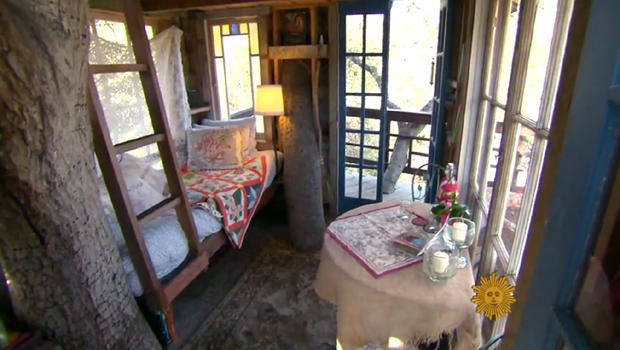Welcome to the new economy built on sharing
(CBS News) "Share and share alike" is more than just good advice for how to get along with your family and friends. It can also be good advice for how to do business with perfect strangers. Our Cover Story is reported by John Blackstone . . .
A previous version of this story was broadcast on March 24, 2013.
If you're looking for a place to spend the night near San Francisco, might we suggest you skip the downtown hotel and step out on a limb with Doug Studebaker's tree house.
"On a clear day we're able to see Mount Diablo, which is the tallest point in the Bay Area," he told Blackstone.
People from around the world find Studebaker's treehouse on Airbnb, a website that has made it possible for anybody, anywhere to rent out a room by the night -- even if that room is in a 150-year-old California oak.
Studebaker said he never imagined he'd be in the hospitality business, "or that people from around the world would want to come and stay in this little whimsical tree house!"
Airbnb handles the booking and the payment -- around $200 a night -- for Studebaker's tree house.
"We do make money from this," he said, adding, "It is a nice way to share."
Studebaker is part of what is being called the "sharing economy." With the Internet acting as a matchmaker, individuals can now rent out almost anything to anybody.
There are car-sharing services, like Getaround and RelayRides. Want to pretend you can afford a $100,000 electric car? Well, the owner of one Tesla will share it with you, for $25 an hour.
Do you need some unconditional love and affection? Well, you can share a dog!
Want a bow tie for a night rather than a lifetime? Go to the Tie Society.
On sharing sites offering everything from parking spaces to electronics, individuals are increasingly doing business with each other, instead of with big companies.
And with more than 300,000 rentals listed, Airbnb now rivals many hotel chains.
Although some cities are now enforcing laws that prohibit renting out apartments by the night, Airbnb now rivals many hotel chains, with more than 300,000 rentals listed.
Forbes magazine recently estimated $3.5 billion will flow through the sharing economy this year.
Former Treasury Secretary Lawrence Summers is a big booster of the sharing economy -- not just because it makes people feel good, but because he thinks it's good business.
"By bringing people together, by sharing our resources more efficiently, we have a better economy; we're able to live better," Summer said.
"We're moving into a different kind of economy where cars can get used, rather than parked," Summers continued. "Where empty apartments can become a lower-cost place to stay, and where people who have money that they're not going to need to access immediately can put it to good use, helping other people who have credit card debts to consolidate, or kids to send to college, or cars to buy."
Summers recently joined the board of Lending Club, a business that lets people share their money, giving both lenders and borrowers a better deal than they would get at a bank.
"Yes, it's easy to compete against a one-percent interest rate," laughed Lending Club's founder, the French financial guru Renaud Laplanche, "especially as we've delivered on average between six- and nine-percent net return to investors each year since we started."
Laplanche started Lending Club in 2007, back when the U.S. economy was heading off a cliff. To the surprise of many, the company has thrived. By the by the end of this year, Lending Club will have arranged loans worth more than $3 billion.
Neal Gorenflo told Blackstone he'd actually loaned money to strangers on Lending Club, and received a return, on average, of nine percent.
In 2011, Gorenflo spent a year living as much as he could in the sharing economy, for transportation, travel, child care and more, saving him more than $17,000.
"I think, more importantly, our quality of life got better," he said. "New friendships, learning new things -- feeling more connected to the world in many ways."
He works in a shared office space in San Francisco, publishing a non-profit web-based magazine about sharing, called (what else?) Shareable.
But before you conclude the sharing economy is the sole domain of hip, young urbanites, let us share the story of Peg Powell.
Powell was near retirement when she lost her job in Silicon Valley two years ago. She was faced with the prospect of losing her home. So she leapt into the sharing economy, renting her home on Airbnb, and her car on Getaround.
A room at Powell's goes for $73 a night. And there are amenities: "I did want to mention I also make some awesome pancakes on Saturdays," she laughed.
It harkens back to the days when women in small towns opened boarding houses as a way to make ends meet. "Yeah, it is an old idea brought up-to-date," Powell said.
It turns out, what we all learned as children -- that sharing is good -- is as true today as ever.
For more info:
